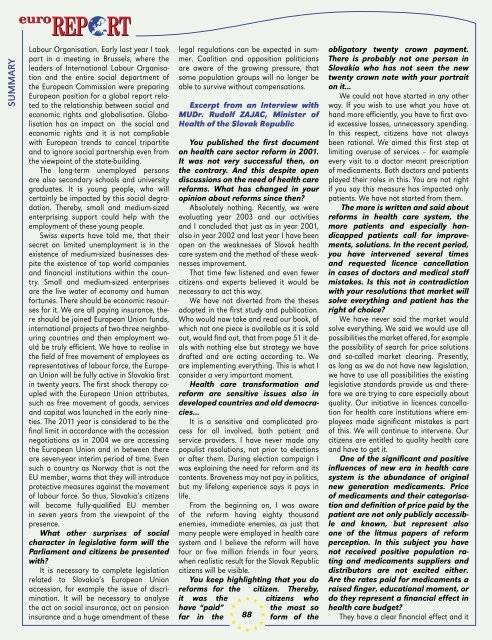Otvoriť - EUROREPORT plus
Otvoriť - EUROREPORT plus
Otvoriť - EUROREPORT plus
- No tags were found...
Create successful ePaper yourself
Turn your PDF publications into a flip-book with our unique Google optimized e-Paper software.
SUMMARYLabour Organisation. Early last year I tookpart in a meeting in Brussels, where theleaders of International Labour Organisationand the entire social department ofthe European Commission were preparingEuropean position for a global report relatedto the relationship between social andeconomic rights and globalisation. Globalisationhas an impact on the social andeconomic rights and it is not compliablewith European trends to cancel tripartiteand to ignore social partnership even fromthe viewpoint of the state-building.The long-term unemployed personsare also secondary schools and universitygraduates. It is young people, who willcertainly be impacted by this social degradation.Thereby, small and medium-sizedenterprising support could help with theemployment of these young people.Swiss experts have told me, that theirsecret on limited unemployment is in theexistence of medium-sized businesses despitethe existence of top world companiesand financial institutions within the country.Small and medium-sized enterprisesare the live water of economy and humanfortunes. There should be economic resoursesfor it. We are all paying insurance, thereshould be joined European Union funds,international projects of two-three neighbouringcountries and then employment wouldbe truly efficient. We have to realise inthe field of free movement of employees asrepresentatives of labour force, the EuropeanUnion will be fully active in Slovakia firstin twenty years. The first shock therapy coupledwith the European Union attributes,such as free movement of goods, servicesand capital was launched in the early nineties.The 2011 year is considered to be thefinal limit in accordance with the accessionnegotiations as in 2004 we are accessingthe European Union and in between thereare seven-year interim period of time. Evensuch a country as Norway that is not theEU member, warns that they will introduceprotective measures against the movementof labour force. So thus, Slovakia’s citizenswill become fully-qualified EU memberin seven years from the viewpoint of thepresence.What other surprises of socialcharacter in legislative form will theParliament and citizens be presentedwith?It is necessary to complete legislationrelated to Slovakia’s European Unionaccession, for example the issue of discrimination.It will be necessary to analysethe act on social insurance, act on pensioninsurance and a huge amendment of theselegal regulations can be expected in summer.Coalition and opposition politiciansare aware of the growing pressure, thatsome population groups will no longer beable to survive without compensations.Excerpt from an Interview withMUDr. Rudolf ZAJAC, Minister ofHealth of the Slovak RepublicYou published the first documenton health care sector reform in 2001.It was not very successful then, onthe contrary. And this despite opendiscussions on the need of health carereforms. What has changed in youropinion about reforms since then?Absolutely nothing. Recently, we wereevaluating year 2003 and our activitiesand I concluded that just as in year 2001,also in year 2002 and last year I have beenopen on the weaknesses of Slovak healthcare system and the method of these weaknessesimprovement.That time few listened and even fewercitizens and experts believed it would benecessary to act this way.We have not diverted from the thesesadopted in the first study and publication.Who would now take and read our book, ofwhich not one piece is available as it is soldout, would find out, that from page 51 it dealswith nothing else but strategy we havedrafted and are acting according to. Weare implementing everything. This is what Iconsider a very important moment.Health care transformation andreform are sensitive issues also indeveloped countries and old democracies…It is a sensitive and complicated processfor all involved, both patient andservice providers. I have never made anypopulist resolutions, not prior to electionsor after them. During election campaign Iwas explaining the need for reform and itscontents. Braveness may not pay in politics,but my lifelong experience says it pays inlife.From the beginning on, I was awareof the reform having eighty thousandenemies, immediate enemies, as just thatmany people were employed in health caresystem and I believe the reform will havefour or five million friends in four years,when realistic result for the Slovak Republiccitizens will be visible.You keep highlighting that you doreforms for the citizen. Thereby,it was the citizens whohave “paid”the most sofar in theform of theobligatory twenty crown payment.There is probably not one person inSlovakia who has not seen the newtwenty crown note with your portraiton it…We could not have started in any otherway. If you wish to use what you have athand more efficiently, you have to first avoidexcessive losses, unnecessary spending.In this respect, citizens have not alwaysbeen rational. We aimed this first step atlimiting overuse of services – for exampleevery visit to a doctor meant prescriptionof medicaments. Both doctors and patientsplayed their roles in this. You are not rightif you say this measure has impacted onlypatients. We have not started from them.The more is written and said aboutreforms in health care system, themore patients and especially handicappedpatients call for improvements,solutions. In the recent period,you have intervened several timesand requested licence cancellationin cases of doctors and medical staffmistakes. Is this not in contradictionwith your resolutions that market willsolve everything and patient has theright of choice?We have never said the market wouldsolve everything. We said we would use allpossibilities the market offered, for examplethe possibility of search for price solutionsand so-called market clearing. Presently,as long as we do not have new legislation,we have to use all possibilities the existinglegislative standards provide us and thereforewe are trying to care especially aboutquality. Our initiative in licences cancellationfor health care institutions where employeesmade significant mistakes is partof this. We will continue to intervene. Ourcitizens are entitled to quality health careand have to get it.One of the significant and positiveinfluences of new era in health caresystem is the abundance of originalnew generation medicaments. Priceof medicaments and their categorisationand definition of price paid by thepatient are not only publicly accessibleand known, but represent alsoone of the litmus papers of reformperception. In this subject you havenot received positive population ratingand medicaments suppliers anddistributors are not excited either.Are the rates paid for medicaments araised finger, educational moment, ordo they represent a financial effect inhealth care budget?They have a clear financial effect and itwas represented in the fact, that we managedto decrease the cost of medicaments.I am convinced should the President nothave returned the amendment on paymentsfor prescriptions for reconsideration, we would have decreased the cost evenfurther. We have increased the V.A.T. onmedicaments and so partially compensatedfor the losses resulting from limitedsale of medicaments. I believe it was acorrect approach sides the Ministry. Yes,citizens have the right of choice, the rightof selection.You started in the Minister seat inyear 2002 with a clear idea and goal,the reform was practically ready – itspicture and outlines. Why is it takingso long?Legislative process is a very complicatedissue. I started in my position with twoact drafts already prepared. I thought wewould first change one act after another,but it is simply not possible to do it thatway. Time is truly needed for such a bigand extensive reform, it cannot be donefrom day to day or year to year. I havealready prepared a complete package ofacts and we will see about their fate in theParliament.The biggest scandal so far hasbeen caused by information and non--information about company “Creditor”.The level of this company secrecycould be considered a crucial mistake.Why have you, such an open person,consented to this platform?I do not think it was kept secret andwe were not planning to keep somethingsecret. The Ministry has only a fifty percent share in this public limited companyand I believe the people in “Creditor” managementand Board of Directors shouldbe explaining.Nevertheless, it proved it dealt morewith political theory rather than politicsitself just as in many other cases. Our ideawas to stop indebtedness, slow down thegrowth of debts in health care sector andwe succeeded in doing so. We have introduceda system into debts settlement andmany do not like it. The biggest critic andcomplainant used Creditor for its debtssettlement.The report on activities is available, wehave provided it to the SR Government andParliament, everybody may read it.Excerpt from an Interview withMUDr. Petter OTTINGER, StateSecretary of the Ministry of Healthof the Slovak RepublicYou moved to the position of Ministryof Health State Secretary from theposition of Slovak Hospitals Association.Do you think you can do more forhospitals as State Secretary?Work in the Slovak Hospitals Associationwas interesting chapter in my carrier.I have already heard opinions, that I usedthe Association as a means to the positionof State Secretary.Of course, it was not the case and Iwould like to mention it. I was truly convincedof hospitals transformation to non-forprofit organisations. Helping this process,contributing to Slovak health care transformation,that was my goal when acceptingthe position. More and more organisationsare joining the so far fourteen non-for profitorganisations providing health care andcompared with other hospitals, they aredoing well. So if it was only for this systemmove, my decision was worthy of it.There probably was not one hospitalmanager, who would not agreewith the patient charges for hospitalstays. They accepted this part of reformvery positively. Who was mosthelped with the fifty crowns per daypaid by patient?Who was most helped is not decisive.It is much more important for both the citizensand health care staff to understandit is necessary to contribute a fixed amounttowards certain services.There have been long discussionsabout who should be a hospital manager– a doctor or an economist?Whom would you prefer?The question does not deal with a decisionbetween a doctor or economist. Itshould not concern the qualification economist,doctor, lawyer… A hospital managershould be a person with managerial abilitiesand such person can be an economist,lawyer or a doctor.Many years, we have been talkingabout having too many hospitals andhospital beds. What are we strivingfor within the current reform, savingmeasures, hospitals joining and certaindepartments closure?We have already spoken about restructuring.It will certainly continue in regionalhospitals. They should gradually createpoly-functional departments we wouldcurrently call maybe surgery or internalmedicine departments.It is one of the options how we cansucceed in increasing these health careestablishments efficiency. Weare also trying to createlegislative fra- mework for88 89this type of hospital departments.Number of hospital beds – are thereenough or too many, that is relative. For thelimits health insurance houses are currentlylisting, there are too many. However, if weregard it from the patient and services demandpoint of view we get different figuresand see there are not so many.Are hospital managers inclined toreforms? It is general knowledge, thatonce somebody gets a managerialseat, it is difficult to part with it.It does not matter if we speak of reformor transformation, it still concerns thesame. Medicine develops continuously,not only instrumentation, but also medicamentsand they are more and moresophisticated and expensive. It is one ofthe reasons why we are continuously missingfinancial funds in health care and aswe work, we are creating deficit. From thispoint of view, reform or transformation is apermanent action. Who will one day declareto have completed health care reformhas no idea of the issue.There are still hospitals where abouteighty per cent of financial fundsfrom health insurance companies arespent on salaries. What do they treatpatients for?Health care institutions with about 250– 300 beds spend about twenty per centof total monthly budget for medicamentsand diagnostics and twenty per cent foraids and material. Where there are moresurgery or internal medicine departments,the scales move one or the other way.To explain the eighty per cent share ofpersonal costs a lot more space would beneeded. For example, it would be necessaryto compare expenditures per citizen in theSlovak Republic, the Czech Republic, Sloveniaor Austria. It would be necessary tomake a standpoint about average salariesin those countries and highlight, that forthree years – in 1996 (by 40%), 1997 (by25%) and 2001 (doctors by 45%, nurses by25%) health care sector salaries have beendictated “from the top” without insurancebudget modification.Excerpt from an Interview withAnna ZÁBORSKÁ, Chairman of theParliamentary Committee for HealthCareYou are chairing a committee forthe assessment of legal standardsthat should have a reform character.What is your opinion on their qualityalso with respect to the fact, thatthere have been many comments onSUMMARY

















